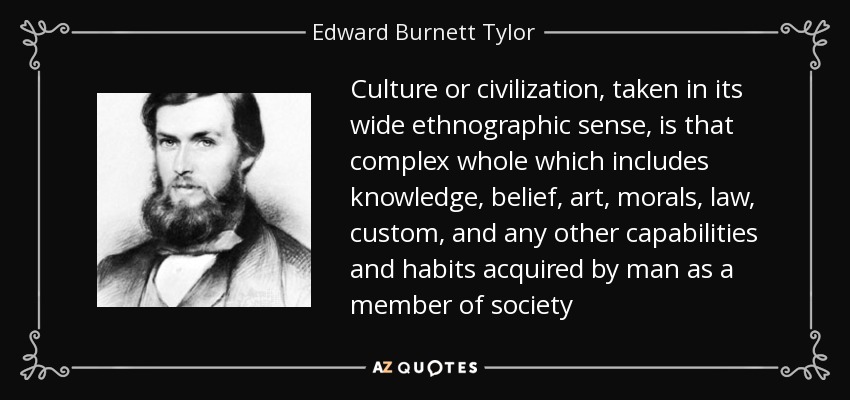The founding father of social anthropology: Who is Edward Burnett Tylor?
British anthropologist. He is the founder of anthropology.

Tylor, who is included in the evolutionist theory, brought the use of statistics to anthropology and inspired anthropological approaches with the famous definition of culture, and has made groundbreaking studies in the fields of religion, belief, kinship, and marriage.
Although his definition of "the complex whole that includes knowledge, belief, art, morals, law, customs and all other abilities and habits acquired by the individual as a member of society is called culture", it has been the subject of criticism over time but has greatly influenced later approaches.
Anthropology is a branch of science that studies people living in past and present communities in various ways. English Sir Edward Burnett Tylor is considered the founder of modern anthropology. He is the person who introduced us to the concept of “survival” in human development. These "survivors" were the ideas, beliefs, and traditions that Tylor observed in the modern world from time immemorial. Tylor developed a theory of the evolutionary relationship between "primitive" and "modern" cultures. He highlighted the cultural achievements that marked the progress of all humanity from a "wild" state to a "civilized" state.
Personal and Education Life
Edward Burnett Tylor, a London rice mill-owning Quaker industrialist Joseph Tylor and Harriet Skipper on October 2, 1832, in Camberwell, England. He was educated at Grove House private school. Because they were Quakers, members could not study at Oxford or Cambridge University. By contrast, Tylor succeeded in becoming the first professor of anthropology at Oxford University in 1896.
At the age of 16, he was taken out of school to work as a civil servant in his father's business. But seven years later, his health began to deteriorate as his symptoms of tuberculosis developed. In 1855, he traveled to the United States in hopes of better treatment. While passing through Havana, Cuba, in 1856, he ran into Henry Christy (British Archaeologist, 1810-1865), a student of archeology and ethnology. Christy had planned an expedition in Mexico to study the remains of ancient Toltec culture in the Valley of Mexico. Christy persuaded Tylor to accompany him.
Under Christy's experienced guidance, Tylor gained practical knowledge of archaeological and anthropological fieldwork. He traveled in grueling and sometimes dangerous conditions in search of Toltec relics. The expedition lasted six months, and after it ended, Tylor returned to England. He married Anna Fox, a Quaker believer, in 1858. They had no children with Fox, to whom he remained married for the rest of his life. They lived comfortably with Tylor's family legacy. He died in 1917 in Wellington, Somerset, England.
Tylor never traveled again. Instead, he joined the Royal Anthropological Society. Then he independently studied primitive societies. His first book, Anahuac: Or Mexico and the Mexicans Ancient and Modern, in which he described the Mexican expedition, was published in 1861. In 1865 he published his work "Investigations in the Early History of Humanity and the Development of Civilization". This book made Tylor an important figure in anthropology. Then came the book "Primitive Culture (1871)," the most famous work of his life. Also in the same year, Tylor became a member of the Royal Society.
He received his Ph.D. in Civil Law from Oxford University in 1875. He wrote the first article on anthropology as a science in the ninth edition of the Encyclopædia Britannica (1878). He published his first anthropology textbook, "Anthropology: An Introduction to the Study of Man and Civilization," in 1881. He was appointed as Keeper of the University Museum (1883), where he lectured on anthropological subjects. Following this, he received the title of First Reader in Anthropology between 1884 and 1895. He published a brief account of his theories (1881) in his book Anthropology.
In 1888, in his work "On the Method of Researching the Development of Institutions", which appeared in the Journal of the Royal Anthropological Institute, he made the first attempt to use statistical knowledge to validate and construct social anthropological theories. He became a Professor of Anthropology in 1896 and was awarded an Honorary Fellowship from Balliol in 1903. He retired in 1909 and was knighted in 1912. Throughout his professional life, Tylor has worked on a cultural construct that will show progress from primitive man to civilized man.
Scientific Contributions
In general, the work of Edward Burnett Tylor has contributed a lot to the field of anthropology. Although Tylor's theories were long ignored, his methods of analysis led to many awards, including a knighthood. He also laid the foundations of anthropology as a science. Although he received no formal education other than his early years at Grove House, his work and passion for anthropology made him the founder of modern anthropology. He also earned the title of the first professor of anthropology at Oxford University.
The theory of animism, including his first book “Anahuac: Or Mexico and the Mexicans Ancient and Modern (1861)” on his exploration of Mexico, “Researches into the Early History of Mankind and the Development of Civilization (1865)”, “Primitive Culture (1871)”, “Anthropology (1881)” and “On the Method of Researching the Development of Institutions” and more. "Culture; It is a complex whole that includes knowledge, belief, art, morals, law, tradition and other abilities and habits acquired by human beings as a member of society," he offered a broad framework for this concept, unlike his colleagues who examined the concept of culture in narrower terms.
